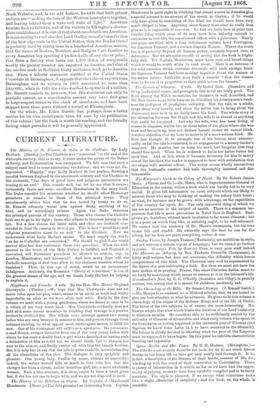CURRENT LITERATURE.
The Mission of St. Francis de Sales in the Chablais. By Lady Herbert. (Bentley.)—The Chablais was " converted " at the end of the sixteenth century, that is to say, it came under the power of the Dukes of Savoy, and Protestantism was extirpated. Wo felt sure that such a subject must lead to some interesting revelations ; and we were not dis- appointed. "Happily," says Lady Herbert in her preface, drawing a parallel between England in the nineteenth century and the Chablais in the sixteenth, "the days of penal laws and religious persecution are coming to an end." This sounds well, but let us see what it means ; fortunately there are some excellent illustrations in the story itself. The Duke consults his ministers whether he should allow Protestant preachers to remain in three of the principal towns. They unanimously advise him that he was bound by treaty to do so. St. Francis solemnly warns him against doing anything of the kind, and he accordingly refuses. Again the Duke convenes the principal persons of the country. Those who choose the Catholic faith are to go to his right ; those who adhere to Genevan heresy to the left. Not a few choose the latter faith, and these are forthwith com- manded to leave the country in three (Lys. This is how "penal laws and religious perseoution came to an end' in the Ch Lblais. Now we understand what Lady Herbert moans. We must supply the words "as far as Catholics are concerned." We should be glad if she would answer after her fine sentiment these two questions. When the wish nearest to the heart of the Holy Father is fulfilled, and England is
converted, will Protestant preachers be allowed to rem say, in London, Manchester, and Liverpool? And how many days will the Catholic sovereign of that time allow to the obstinate heretics whom he banishes ? Three, in this age of steam, would be an unnecessary indulgence. Seriously, the Romanist "liberty of cmscience " is one of the greatest shams of the ago, and we thank Lady Herbert for helping to explode it.






























 Previous page
Previous page